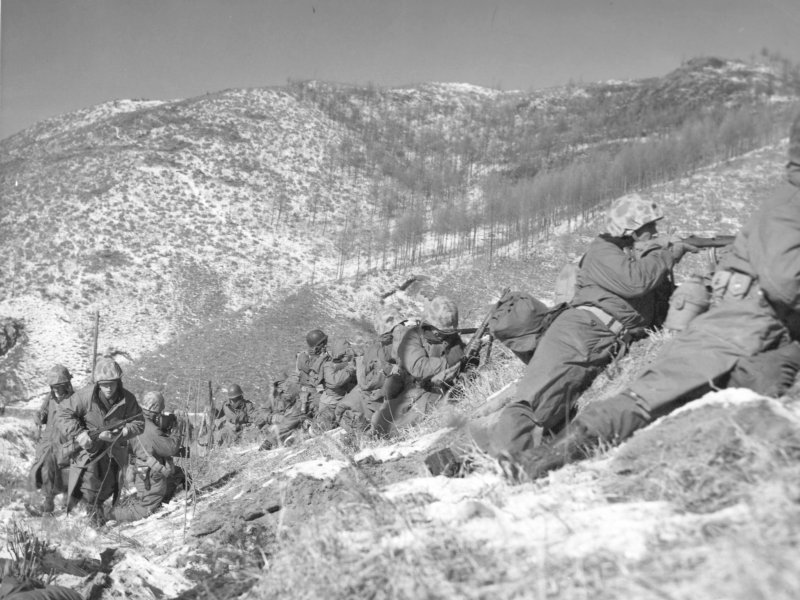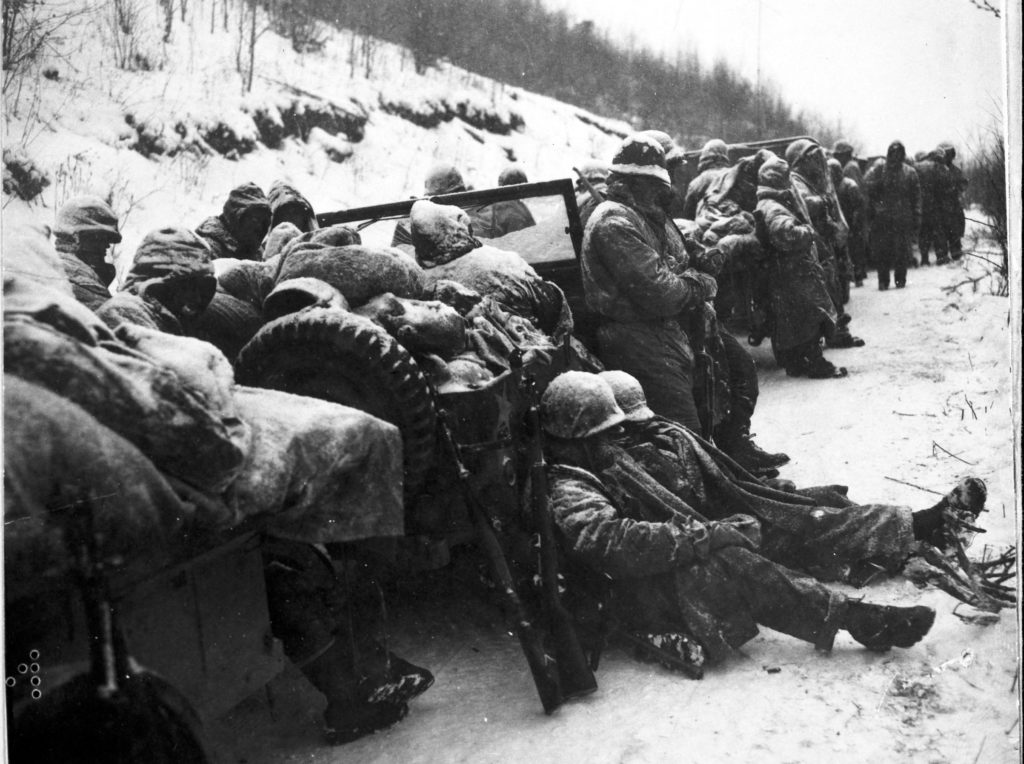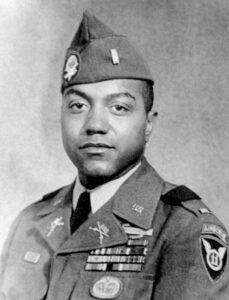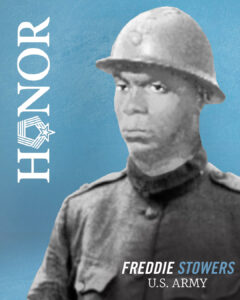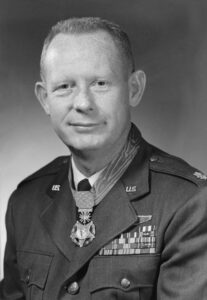The Advance: “Home by Christmas”
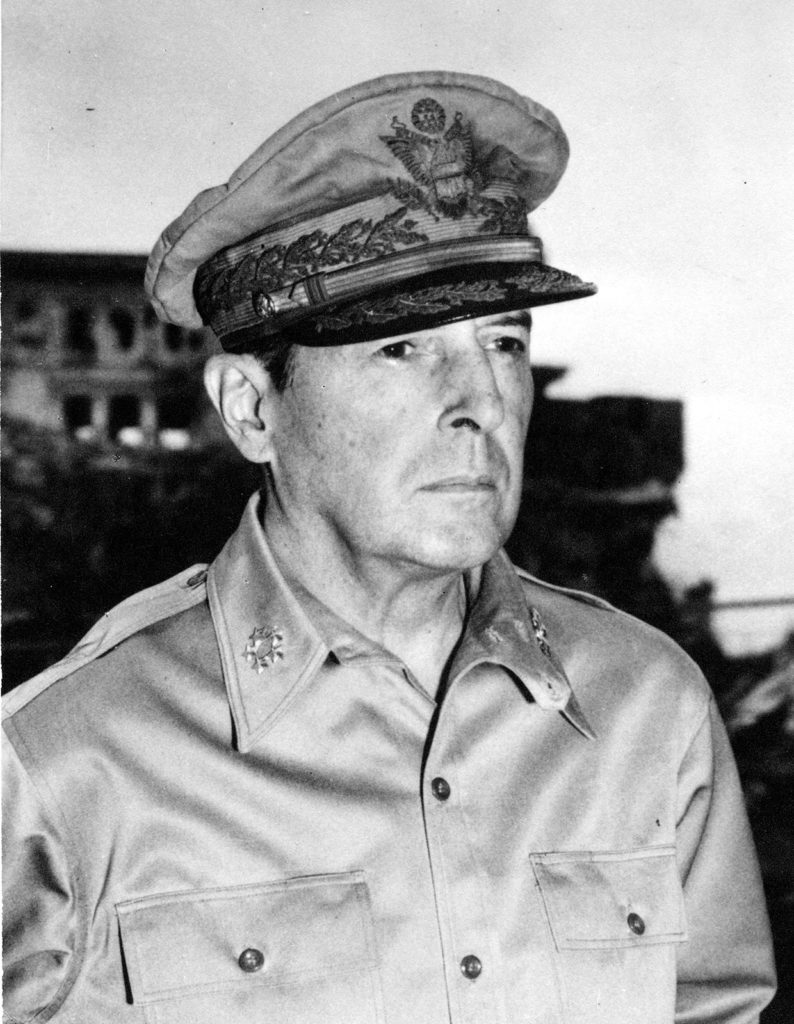
The Inchon landing by the X Corps in September 1950 and the breakout from Pusan by the 8th Army led to a stunning reversal in the Korean War. Gen. Douglas MacArthur’s risky plan had unhinged the Korean People’s Army (KPA) position, and the rapid advance had led to its almost certain destruction. A supremely confident MacArthur declared to President Truman that “organized resistance will be terminated by Thanksgiving.” Later he announced to his troops that they would be home by Christmas.
The X Corps, commanded by the ever-aggressive Maj. Gen. Edward Almond, was pushing to be the first United Nations force to reach the Yalu River. As the temperatures in the mountains of North Korea plummeted, Almond continued to direct his commanders to advance faster. By late November, the 1st Marine Division commanded by Maj. Gen. Oliver Smith and the 31st Regimental Combat Team from the 7th Infantry Division took up positions in the snowcapped mountains around Chosin Reservoir (or Lake Changjin).
The Peoples’ Volunteer Army
While confidence reigned supreme at MacArthur’s headquarters in Tokyo, Japan, the situation at the front was becoming ever more concerning. A Siberian cold front had descended on the region, and temperatures plunged to as low as -36 degrees F. The relentless cold led to frostbite in the ranks, frozen weapons and medical supplies, dead batteries, and more. Even worse, MacArthur and Almond disregarded growing evidence that a sizeable Chinese force had crossed the Yalu to oppose the UN advance approaching its Manchurian border. China’s Chairman Mao Zedong had directed that the veteran 9th Army attack the US forces near Chosin. Stealthily, the Chinese army – roughly 120,000 soldiers from the 20th and 27th Corps – took up positions near the Marines and US Army troops.
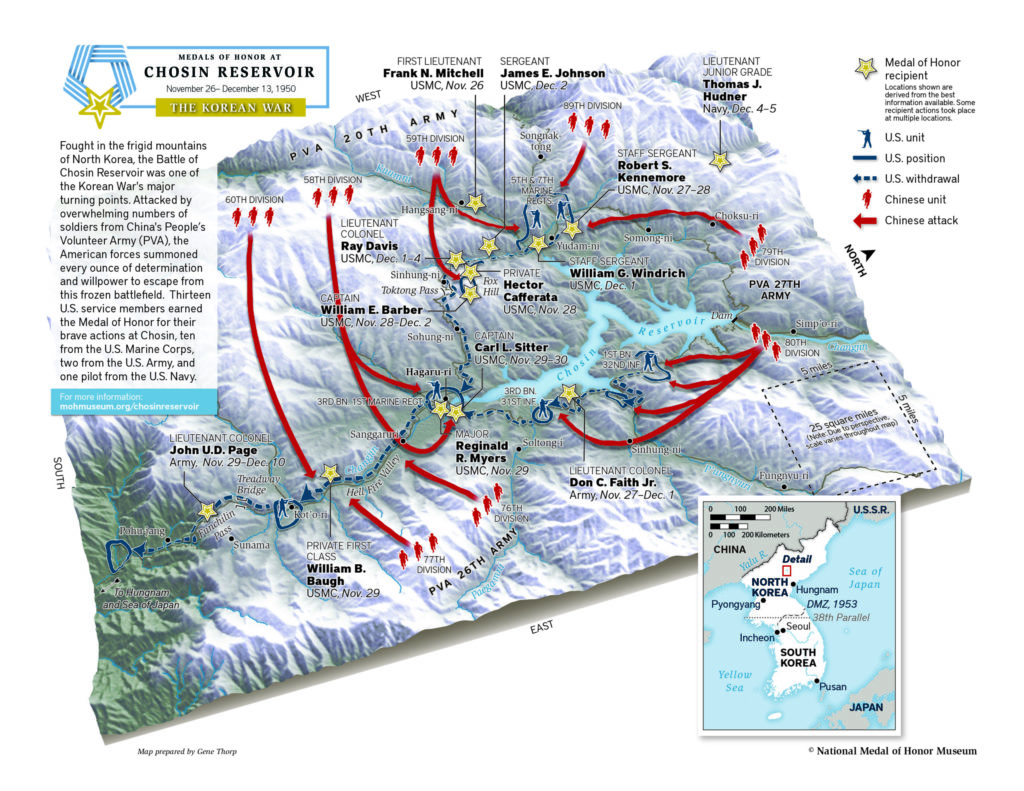
1st Marine Division: The Chinese Attack
After midnight on November 27, 1950, the Marines in their foxholes could hear strange sounds emanating from the woods below. Loudspeakers broadcast curses and commands. Cymbals clanged, and bugles blared. And a chorus of “Marines, tonight you die!” came from the waves of Chinese troops from the 59th, 79th, and 89th Divisions moving up the slopes in their white quilted uniforms.
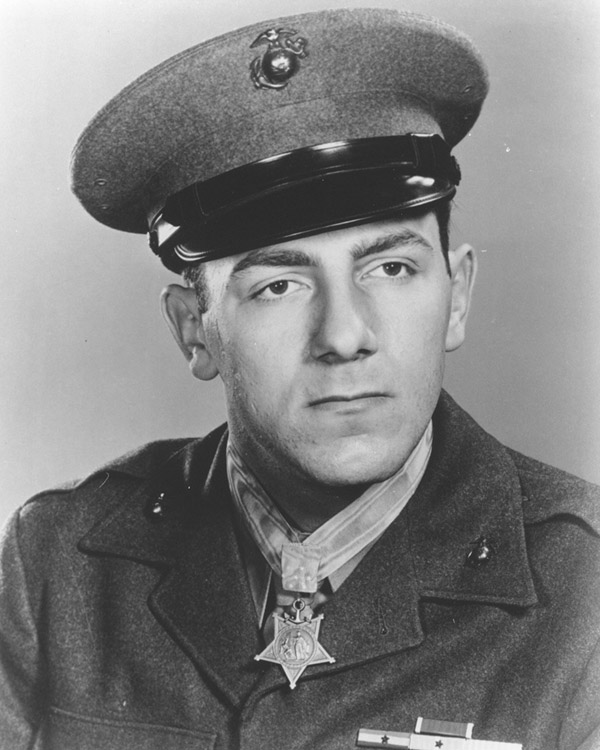
Caught by surprise, the Marines struggled from their sleeping bags and grabbed their weapons. With star shells now illuminating the ground before them, the Marines on the front line attempted to slow the overwhelming Chinese assault with their M-1 rifles, machine guns, and grenades.
The lead Marine elements around Yudam-ni struggled to hold back the Chinese assault while Charlie and Fox Companies of the 7th Marines struggled to defend their thin lines near Toktong Pass. During these intense battles, Marines such as Private Hector Cafferata, Staff Sergeant Robert Kennemore, and Corporal Lee Phillips would earn the Medal of Honor for their brave and resolute actions.
Fox Company, led by Captain William Barber, managed to hold the critical hill above Toktong pass and the vital road below for five days. Despite a severe wound to his leg, Barber kept moving amongst his men’s foxholes, keeping them focused. Barber’s company had taken grievous losses in the fight (only 82 out of 220 original men remained effective), but they had also inflicted great harm on the enemy. As reported in his Medal of Honor citation, Barber’s “heroic command accounted for approximately 1,000 enemy dead in this epic stand in sub-zero weather.”
Task Force Faith (RCT-31)
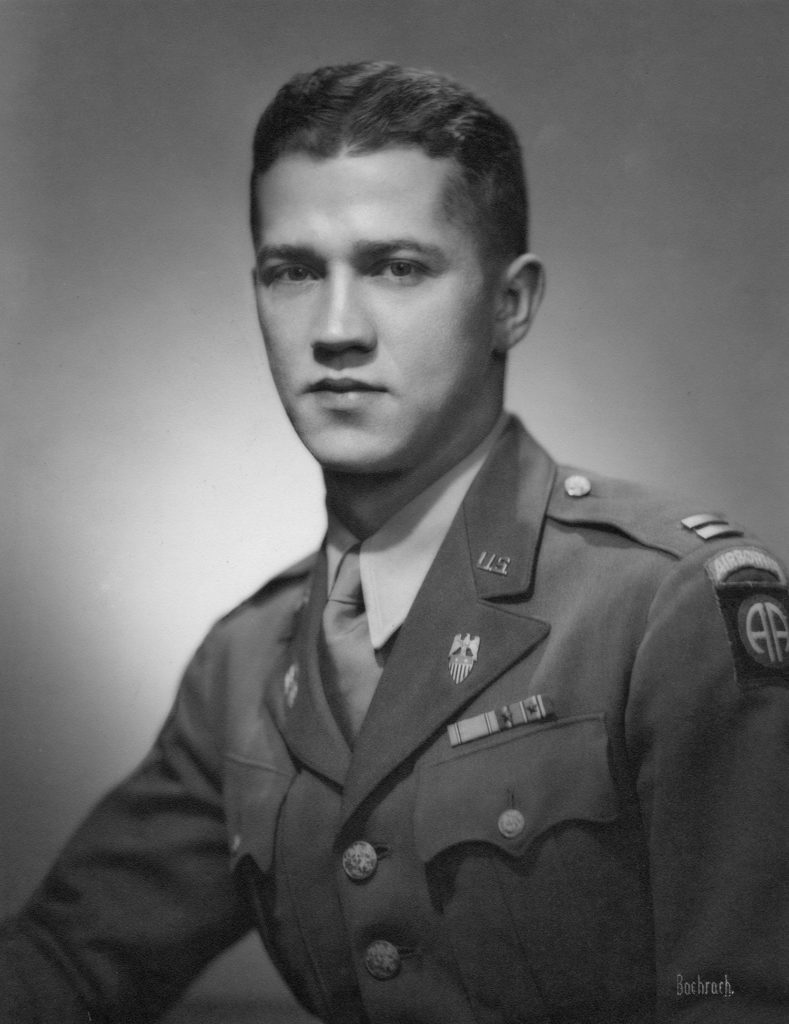
While the Marines were under attack west of the reservoir, the men of Regimental Combat Team 31 were just reaching their newly assigned positions east of the reservoir when Chinese soldiers attacked them from the 80th and 81st Divisions of the PVA. Several key units of RCT 31, including one of its three infantry battalions and its armor company, were far to the rear by the time of the Chinese assaults.
Heavily outnumbered, RCT 31 also had the disadvantage that its two leading battalions were not within supporting range of one another. The Chinese were able to easily penetrate through the gaps, and the risk of complete encirclement was high.
Despite Almond’s urgings to continue the advance, Col. Allan MacLean recognized that the situation was desperate and ordered the northernmost battalion to withdraw southwards. Struggling to extricate themselves from their positions, the soldiers took heavy casualties as they made their way back. During the confusing swirl of battle and retreat, MacLean was captured by the Chinese, and command fell to Lieutenant Colonel Don Faith, and the task force became known henceforth as “Task Force Faith.”
Several attempts to relieve RCT 31, including several by the 31st Tank Company, were stopped on the icy road and driven back. Word from headquarters was passed to Faith that no new attempts to relieve them were coming. With ammunition running low and the bitter cold sapping much of their remaining will, Faith organized a desperate attempt to break out back toward the Marines at Hagaru-ri. With his more than 500 wounded men loaded in stacks on all available trucks, Faith led his men through a terrible Chinese gauntlet. With machine-gun fire pouring down into the trucks and columns, the command struggled to reach safety.
At a hairpin turn in the road, the beleaguered column ran into a Chinese roadblock that stopped their progress. Another moment of crisis had arrived. Realizing the only way to continue the retreat was to attack the Chinese forces upon the nearby hill – Hill 1221 – Faith gathered his remaining men and ammunition and attacked. In the desperate fighting which secured the hill, Faith was mortally wounded by a Chinese grenade. He would later receive the Medal of Honor for his actions. Ten other members from Task Force Faith would earn the Distinguished Service Cross.
Of the more than 2,500 soldiers in this command, more than a thousand were killed or captured during the fighting. Faith’s determined leadership had averted a complete disaster but at the cost of his own life. And Task Force Faith’s sacrifice had not been in vain. Without their tenacious resistance, the Chinese forces on the east side of Chosin would have quickly advanced on and captured Hagaru-ri, thereby dooming more than 15,000 Marines fighting on the western side.
“Advancing in Another Direction”
By November 28, it was evident to Douglas MacArthur that a withdrawal was necessary. The drive to the Yalu was over. MacArthur ordered that the X Corps should evacuate Northern Korea via the port at Hungnam.
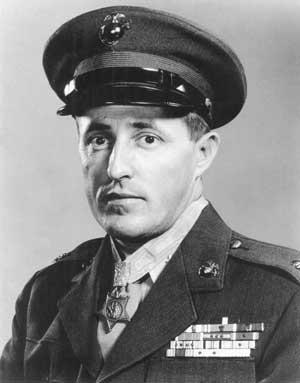
When asked by the media about the order to retreat, Maj. Gen. Smith famously retorted, “Retreat, hell! We’re not retreating; we’re advancing in a different direction.” Whatever term was to be applied, the Marines needed to act quickly or risk being surrounded and decimated by the Chinese forces that greatly outnumbered them. Key to this move south was reopening the only road back to Hagaru-ri and Koto-ri. The Chinese advance had already cut the road near Toktong Pass, and the Marines would need to retake this strategic location before any withdrawal could continue.
The first phase of the breakout involved an epic march through a blinding blizzard by the 1st Battalion, 7th Marines, as they moved toward Fox Company’s position. Led by Captain Ray Davis, the Marines marched “like a chain gang of zombies” through the winter landscape. In a fierce engagement, the 3rd Battalion, 7th Marines recaptured Hills 1542 and 1419, which allowed the remaining Marines to continue south. Davis would later receive the Medal of Honor for his vital leadership during this critical phase.
With all the remaining strength and stamina that they could muster, the Marines fought to secure Toktong pass on December 2, reaching Hagaru-ri the next day.
More resourcefulness and dogged determination would be required to fend off additional Chinese attacks in Hell Fire Valley and in bridging the road through Funchilin Pass.
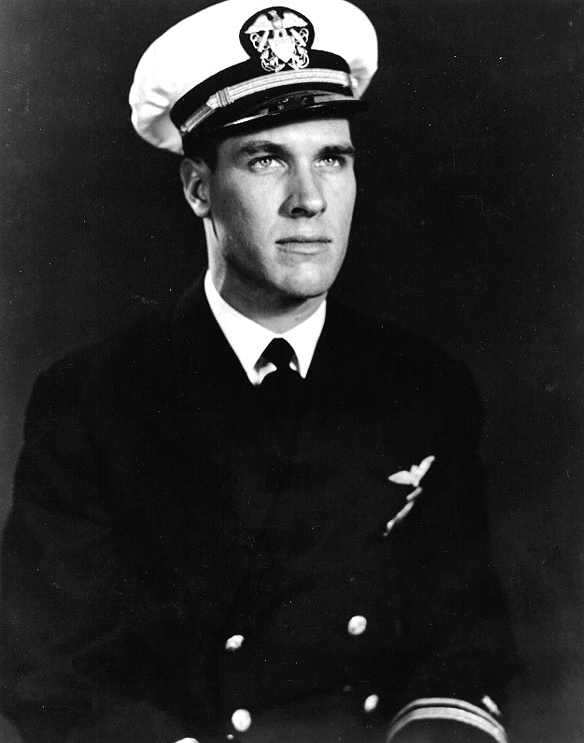
While providing close air support to the troops around Chosin, Ensign Jesse Brown of VF-32 crash-landed his F4U Corsair after being hit by ground fire. Brown, the Navy’s first African American fighter pilot, was a popular squadron member. His wingman, LTJG Thomas Hudner made the fateful choice of crash-landing his own Corsair next to Brown’s stricken plane so that he could come to Brown’s aid. Hudner’s repeated efforts could not extricate Brown who subsequently succumbed to the cold and his injuries. Hudner, who returned to the carrier by rescue helicopter, would later receive the Medal of Honor from President Harry Truman for his actions.
On December 11, the last remaining UN forces left Funchilin Pass, and the Battle of Chosen Reservoir had come to a bitter end. Faced with ever-growing numbers of Chinese troops, the Army and Marines of X Corps reached Hungnam’s port and took part in the largest evacuation by sea in US military history.
Medal of Honor Facts: The Battle of Chosin Reservoir
- Ray Davis would become a four-star general and the Assistant Commandant of the Marine Corps
- LCOL John Page’s Medal of Honor citation includes his actions aboard a tank and his dropping hand grenades from a plane at Chosin. An unusual combination.
- LTJG Thomas Hudner was the only naval aviator to be awarded the Medal of Honor during the Korean War.
- Chosin Reservoir was the first battle where the Marines employed helicopters and jet aircraft.
“The Chosin Few” – Remembrances
The US X Corps and Republic of Korea I Corps reported 10,495 casualties during the fighting around Chosin. And the brutal cold added another 7,388 Marines to the list as non-battle casualties. On the Chinese side, the losses were significant as well. While estimates do vary, historians now believe that the Chinese suffered 19,202 combat casualties and an additional 28,954 non-combat casualties.
The fight for Chosin Reservoir reduced the PVA 9th Army by 1/3rd, and it remained out of action for another three months.
The Battle of Chosin Reservoir would lead to 13 Medals of Honor being awarded to US servicemen – 10 Marines, 2 Army, and 1 Navy*.
The battle is still commemorated today as one of the signature battles for the United States Marine Corps, and those who fought in the battle became known as the “Chosin Few”. There is a Chosin Few Memorial at the Marine Camp Pendleton, a Chosin Few Monument in Semper Fidelis Park at the National Marine Corps Museum, and a 40-mile section of Route 35 in New Jersey named for the battle. And in 1991, the US Navy commissioned the USS Chosin (CG-65) in memory of this pivotal battle, and the USS Thomas Hudner (DDG-116) was named for the Chosin Reservoir Medal of Honor recipient.
- Some sources include four additional Marines within the totals for Chosin, but we have only counted those whose actions occurred between November 27 and December 13 – dates more commonly associated with the Battle of Chosin Reservoir.
